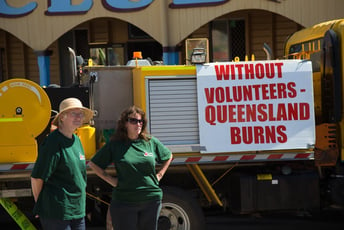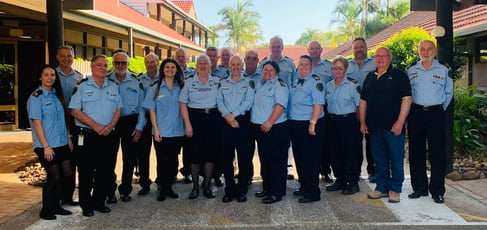It’s all about Money and Power
Introduced without notice with a greatly reduced time for brigades and communities to have their...

Yesterday the changes to the fire service act were read for the first time in Parliament.
Link to bill - https://documents.parliament.qld.gov.au/tp/2024/5724T328-AD98.pdf
Below is the Hansard excerpt or you can click on the video of the minister introducing the bill.
➡️ To watch on Parliament TV (including the full session of Parliament), click here.
Excerpt from "RECORD OF PROCEEDINGS (PROOF)", FIRST SESSION OF THE FIFTY-SEVENTH PARLIAMENT, Thursday, 7 March 2024
Hansard Home Page: http://www.parliament.qld.gov.au/work-of-assembly/hansard
Introduction
Hon. N BOYD (Pine Rivers—ALP) (Minister for Fire and Disaster Recovery and Minister for Corrective Services) (11.56 am): I present a bill for an act to amend the Disaster Management Act 2003, the Disaster Management Regulation 2014, the Fire and Emergency Services Act 1990, the Fire and Emergency Services Regulation 2011, the Queensland Reconstruction Authority Act 2011, the State Penalties Enforcement Regulation 2014 and the legislation mentioned in schedule 1 for particular purposes. I table the bill and the explanatory notes and a statement of compatibility with human rights.
I nominate the Community Safety and Legal Affairs Committee to consider the bill.
Tabled paper: Disaster Management and Other Legislation Amendment Bill 2024.
Tabled paper: Disaster Management and Other Legislation Amendment Bill 2024, explanatory notes.
Tabled paper: Disaster Management and Other Legislation Amendment Bill 2024, statement of compatibility with human rights.
I am pleased today to introduce the Disaster Management and Other Legislation Amendment Bill. This is a very important step in reform and improvement of Queensland’s emergency service and disaster management systems. Queensland is the most disaster affected state in Australia, and we must make sure our emergency services agencies are set up to respond properly to the impact of natural disasters that are expected to worsen as a result of climate change.
We are undertaking these reforms to implement recommendations to the independent review of the Queensland Fire and Emergency Services, and the Inspector-General Emergency Management’s review of Queensland’s disaster management arrangements. This bill will amend the Fire and Emergency Services Act 1990 to establish Queensland Fire and Rescue and Rural Fire Service Queensland as dedicated fire services under the act.
The commissioner will continue to lead the new Queensland fire department with support from senior persons with experience and expertise in urban and rural environments. The bill establishes the role of the Chief Fire Officer as a statutory position, responsible for providing advice to the commissioner on matters relating to service delivery, operational culture, best practice and innovation, and research across the fire services.
The bill also establishes the roles of Deputy Commissioner, Queensland Fire and Rescue, and Chief Officer, Rural Fire Service Queensland. The membership of Queensland Fire and Rescue will consist of the commissioner, the deputy commissioner and the fire service officers assigned to Queensland Fire and Rescue by the commissioner. Rural Fire Service Queensland membership will consist of the commissioner, the chief officer, fire service officers assigned to Rural Fire Service Queensland by the commissioner, rural fire brigades and rural fire brigade members.
To provide confidence that persons appointed to command and control roles have the right experience and expertise to fulfil the requirements of that role, the commissioner, chief fire officer, deputy commissioner, assistant commissioner and other executive and senior officer roles within Queensland Fire and Rescue must have professional firefighting experience, incident control experience and fire prevention expertise. The level of experience and expertise required will be assessed at a level appropriate for each role.
A person will be eligible for appointment as chief officer or deputy chief officer of Rural Fire Service Queensland only if the person has: rural firefighting experience; or rural incident control expertise; or rural fire prevention expertise. All fire service officers in senior executive and senior officer roles are required to participate in on-call rosters. Mandatory requirements are necessary to reflect the level of command and control proficiency and experience expected for making and overseeing these decisions. For example, they decide where limited air assets are to be deployed to deal with multiple serious fires across the state. Their requisite experience and expertise will be critical in informing these types of decisions—some of which are quite literally life and death decisions—and there is no time to waste in making them. The workforce must have confidence that leaders intimately understand the hazards and the risks ‘ associated with firefighting and emergency operations, as well as the training and systems in place to manage those risks.
This bill ensures the operationally-based mandatory qualifications, skills and experience that the commissioner considers necessary for a particular position are prioritised for consideration when deciding the applicant best suited to that position. It is designed to ensure both firefighters and the community are not placed at unreasonable risk. Importantly, the bill does not change the provisions contained in section 45 of the Public Sector Act 2022. Rather, it clarifies who establishes these requirements and when they are to be considered.
The bill establishes the Rural Fire Service Queensland advisory committee. This committee will provide strong representation by the men and women who volunteer their time for our communities.
They are men and women like we saw in Tara and Wallangarra fighting bushfires; they are the men and women I met hosing out properties in Degarra; and they are the dedicated Cowley Beach residents who I met last week who responded to flooding post-cyclone Jasper. The chief officer will have a direct line to members through a committee. It is intended that the advisory committee will have representation from each of the four Rural Fire Service Queensland regions, with appointment by the minister.
To address historic issues concerning the legal status of rural fire brigades and volunteer protections, the bill formally recognises brigades and their volunteer members as part of Rural Fire Service Queensland. This follows feedback from the Rural Fire Brigades Association Queensland provided as part of the independent review. While the appointment power will apply an incidental power to suspend or remove a person from office under the Acts Interpretation Act 1954, any such action would be subject to natural justice and procedural fairness and, ultimately, subject to a judicial review. Any dismissal is only likely to occur in rare circumstances where it is necessary to protect public safety or the public interest. An example of this would be the involvement of a brigade member in criminal or illegal activities.
The amendments will ensure that volunteer brigade members who act within the course of their duties, and do so carefully and in good faith, will have available protections from legal liability aligned with professional firefighters. The bill also recognises the important roles of rural fire brigade office bearers; that is, the chairperson, the secretary and the treasurer. Rural fire brigades will continue to manage the election of its officers and office bearers with oversight from the commissioner. Current office bearers will continue in their roles when the legislation commences. The commissioner will have the power to remove an office bearer and to disqualify the person from holding any office within a rural brigade, but it is envisaged that this power would be rarely used. It is in contrast to the current situation where the commissioner only has the ability to stand down a brigade and not the individual. A new ‘person in charge’ provision has been included in the bill to respond to circumstances where no first officer or next officer from a rural fire brigade is available during an incident response. Under the legislation, the commissioner can appoint a brigade member or a person in charge of operations to ensure they have appropriate legal protections.
Despite the government making these points clear, I suspect that we will continue to see misinformation from certain elements seeking to undermine these important changes, but I would like to reassure brigade members and volunteers that this is about providing them with legal protections and establishing a separate RFS with its own budget in recognition of the valued and important work that they do. To be clear: yellow trucks will not need to wait for red trucks to respond to an incident.
The bill recognises the importance of the Queensland Disaster Management Committee. This bill recognises the status of QDMC establishing its responsibility in providing strategic leadership for disaster management and disaster operations for the state; however, it is not intended for this committee to be perpetually convened. Where the QDMC is not convened, the State Disaster Management Group may act as a precursor to convening the QDMC and will provide strategic leadership for the state. This bill provides support for the SDMG by requiring the Police Commissioner to appoint an executive officer dedicated to helping the SDMG perform its functions. This bill will further meet IGEM review recommendations by listing the chairperson of the Queensland Crisis Communication Network as an observer of QDMC and declaring the CEO of the Queensland Reconstruction Authority as the state recovery planning and policy coordinator. If the CEO cannot perform the functions of the SRPPC, the chairperson of the QDMC may appoint another appropriately qualified person to perform the functions of the SRPPC.
The bill also includes amendments to the Fire and Emergency Services Act 1990 to require smoke alarms to be installed in caravans and motorhomes in Queensland. This requirement aligns with the final stage of the rollout of smoke alarm legislation for domestic dwellings.
I acknowledge the Reform Implementation Taskforce in their work to oversee and coordinate the implementation of these reforms while ensuring service delivery is unaffected. My greatest thanks go to our dedicated emergency services personnel—the thousands of staff and volunteers who risk their lives to keep our community safe. I have had the pleasure of meeting many of these brave individuals as I have travelled across Queensland during recent disasters. Their extraordinary work is essential and valued by all Queenslanders. As Queensland is the most disaster-prone state in the country, we will continue to support our emergency services in prevention, preparedness, response and recovery.
I commend the bill to the House.



Introduced without notice with a greatly reduced time for brigades and communities to have their...


The below resolution was passed unanimously by the elected RFBAQ Representatives on Saturday the 14...